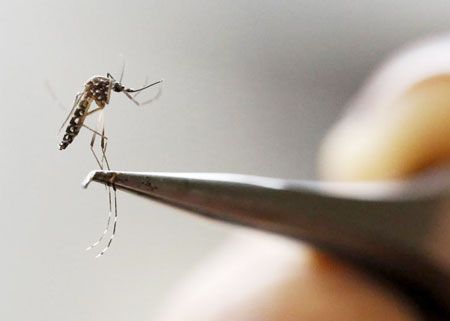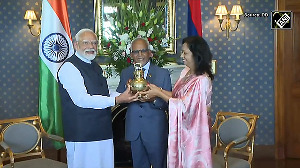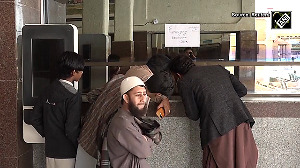 As the number of deaths in Delhi due to chikungunya and its complications have shown a spike, health experts say the sudden "upsurge" of the disease this year could be a result of "evolution" of the viral strain.
As the number of deaths in Delhi due to chikungunya and its complications have shown a spike, health experts say the sudden "upsurge" of the disease this year could be a result of "evolution" of the viral strain.
Doctors have detected that the viral strain is showing "different behaviour", though it will only be conclusive once research is conducted on the make up of the virus.
"Dengue and chikungunya both are caused by the same aedes mosquito but dengue can be contracted through four viral strains while chikungunya is caused only by one strain.
"Also, in dengue cases, some strains are more virulent than other ones. The number of rising cases of chikungunya this year after the 2006 spike could be due to an evolution in its strain," National Vector Borne Disease Control Programme Director A C Dhariwal said.
Experts also feel that north Indians could be succumbing to the vector-borne disease because of their "low immunity" to it.
"People in north India haven't been really exposed to the chikungunya strain compared to the population in the southern part of the country, and therefore they are more vulnerable to this viral attack," said Municipal Health Officer of SDMC, P K Hazarika.
He, however, said the probability of evolution of the viral strain will just be a speculation until scientists establish it.
IgM-ELISA and reverse transcription polymerase chain reaction are the two main tests used to detect chikungunya in patients.
A senior doctor at Sir Ganga Ram Hospital says the viral strain in patients diagnosed with chikungunya at its hospital are "showing different behaviour" for the two tests.
"We used IgM serology on patients earlier but then after finding discrepancy between clinical diagnosis and laboratory tests, we started performing molecular test to detect the chikungunya virus from the blood of clinically suspected patients from September 1 onwards," the doctor said.
"And from September 1-13, out of 565 samples of suspected viral fever, 319 came positive for chikungunya virus which is about 56 per cent positivity. So, we found out that a test coming negative by IgM is coming positive by RT-PCR. And, this could mean the number of cases in Delhi could be much higher than currently reported," he said.
Arun R Kaushik, specialist in microbiology and geriatrics, says, "Chikungunya virus is transmitted by the bite of aedes albopictus and aedes aegypti mosquitoes. The risk of death is about one in 1,000 especially common among the elderly or those with underlying chronic medical problems."
"The prevalence of arbovirus infections similar to chikungunya virus in south India especially in states like Karnataka, Tamil Nadu have made people tolerant to these infections," said the Bangalore-based doctor.
The number of chikungunya cases in the national capital have climbed to over 1,700 this season and at least 12 deaths have been reported due to the disease.
Medical Superintendent of Safdarjung Hospital A K Rai also says that several outbreaks of chikungunya in southern parts of the country have "boosted their immune system" to this virus.
According to the NVBDCP, around 14,656 cases of chinkungunya have been reported across the country till September 11. Karnataka alone has recorded 9,427 cases, Maharashtra 1,024 and Andhra Pradesh 543.
Karnataka in the last few years has recored massive cases of chikungunya -- 8740 (in 2010), 1941 (in 2011), 2382 (in 2012), 5295 (in 2013), 6962 (2014) and 20763 (2015), according to the latest figure released by the NVBDCP.
Tamil Nadu which saw 4319 cases in 2010, 4194 (in 2011) and 5018 (in 2012) in later years saw successive decline. So, in 2013 it saw 859 cases, 543 (in 2014), 329 (in 2015) and 42 cases this year.
Chikungunya is a self-limiting disease in vast majority of cases and requires only symptomatic treatment with paracetamol and adequate hydration. Most of these patients recover at home and do not require hospitalisation.
Rai says, "At Safdarjung, 536 chikungunya cases have been confirmed. But, people should not panic, they should take adequate fluid and rest.
"In chikungunya the complications triggered by co-morbid conditions lead to death. So, people who are diabetic or have heart or blood pressure or kidney problems should consult doctors and see if their medicine needs to be changed."
The sudden spike in chikungunya cases in Delhi and several other parts of north India has come nearly 10 years after a big outbreak of the mosquito-borne disease across the country.
Prakash Kalra, 75, from Mathura died on Wednesday evening at Sir Ganga Ram Hospital, where three other elderly persons succumbed to the disease on Monday. Five fatalities were reported on Wednesday at Apollo Hospital, including a woman and three elderly men. A 22-year-old girl also died at municipal-run Hindu Rao Hospital on September 1.











 © 2025
© 2025